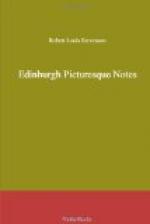New-year’s Day, the great national festival, is a time of family expansions and of deep carousal. Sometimes, by a sore stoke of fate for this Calvinistic people, the year’s anniversary fails upon a Sunday, when the public-houses are inexorably closed, when singing and even whistling is banished from our homes and highways, and the oldest toper feels called upon to go to church. Thus pulled about, as if between two loyalties, the Scotch have to decide many nice cases of conscience, and ride the marches narrowly between the weekly and the annual observance. A party of convivial musicians, next door to a friend of mine, hung suspended in this manner on the brink of their diversions. From ten o’clock on Sunday night, my friend heard them tuning their instruments: and as the hour of liberty drew near, each must have had his music open, his bow in readiness across the fiddle, his foot already raised to mark the time, and his nerves braced for execution; for hardly had the twelfth stroke. sounded from the earliest steeple, before they had launced forth into a secular bravura.
Currant-loaf is now popular eating in all house-holds. For weeks before the great morning, confectioners display stacks of Scotch bun — a dense, black substance, inimical to life — and full moons of shortbread adorned with mottoes of peel or sugar-plum, in honour of the season and the family affections. ‘Frae Auld Reekie,’ ’A guid New Year to ye a’,’ ‘For the Auld Folk at Hame,’ are among the most favoured of these devices. Can you not see the carrier, after half-a-day’s journey on pinching hill-roads, draw up before a cottage in Teviotdale, or perhaps in Manor Glen among the rowans, and the old people receiving the parcel with moist eyes and a prayer for Jock or Jean in the city? For at this season, on the threshold of another year of calamity and stubborn conflict, men feel a need to draw closer the links that unite them; they reckon the number of their friends, like allies before a war; and the prayers grow longer in the morning as the absent are recommended by name into God’s keeping.
On the day itself, the shops are all shut as on a Sunday; only taverns, toyshops, and other holiday magazines, keep open doors. Every one looks for his handsel. The postman and the lamplighters have left, at every house in their districts, a copy of vernacular verses, asking and thanking in a breath; and it is characteristic of Scotland that these verses may have sometimes a touch of reality in detail or sentiment and a measure of strength in the handling. All over the town, you may see comforter’d schoolboys hasting to squander their half-crowns. There are an infinity of visits to be paid; all the world is in the street, except the daintier classes; the sacramental greeting is heard upon all sides; Auld Lang Syne is much in people’s mouths; and whisky and shortbread are staple articles of consumption.




